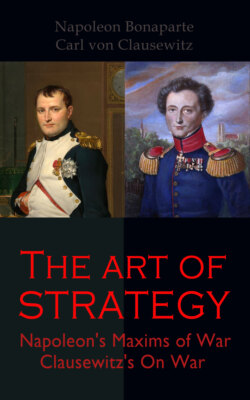Читать книгу The Art of Strategy: Napoleon's Maxims of War + Clausewitz's On War - Carl von Clausewitz - Страница 15
На сайте Литреса книга снята с продажи.
ОглавлениеMAXIM X.
Table of Contents
When an army is inferior in number, inferior in cavalry, and in artillery, it is essential to avoid a general action. The first deficiency should be supplied by rapidity of movement; the want of artillery, by the nature of the manœuvres; and the inferiority in cavalry, by the choice of positions. In such circumstances, the morale of the soldier does much.
NOTE.
The campaign of 1814 in France was skilfully executed upon these principles. Napoleon, with an army inferior in number, an army discouraged by the disastrous retreats of Moscow and of Leipzig, and still more by the presence of the enemy in the French territory, contrived, notwithstanding, to supply his vast inequality of force by the rapidity and combination of his movements. By the success obtained at Champ-Aubert, Montmirail, Montereau, and Rheims, he began to restore the morale of the French army. The numerous recruits of which it was composed, had already acquired that steadiness of which the old regiments afforded them an example, when the capture of Paris, and the astonishing revolution it produced, compelled Napoleon to lay down his arms.
But this consequence resulted rather from the force of circumstances than from any absolute necessity; for Napoleon, by carrying his army to the other side of the Loire, might easily have formed a junction with the armies of the Alps and Pyrenees, and have reappeared on the field of battle at the head of a hundred thousand men. Such a force would have amply sufficed to re-establish the chances of war in his favor; more especially as the armies of the allied sovereigns were obliged to manœuvre upon the French territory with all the strong places of Italy and France in their rear.
